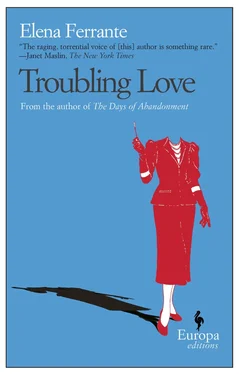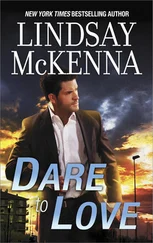“Why did you come to the shop?” he asked, annoyed, sliding back along my body, which was dripping with sweat. “I didn’t come looking for you.”
“I didn’t even know who you were,” I said.
“And all that nonsense? The dress, the underpants. . what did you want?”
“I didn’t come to see you,” I said, but without aggression. “I just wanted to see your father. I wanted to know what had happened to my mother before she drowned.”
I realized that he wasn’t convinced and was trying to caress me again. I shook my head to let him understand: enough. He squatted over me for an instant. He pulled back abruptly with a gesture of repulsion as he felt me soaking wet.
“You’re not well,” he said uncertainly.
“I’m fine. But even if I were sick, it would be too late to cure me.”
Polledro turned over beside me in resignation. I saw in the half light that he was drying his fingers, his face, his legs with the sheet; then he turned on the lamp on the night table.
“You look like a ghost,” he said, gazing at me, without irony, and, with an edge of the shirt that he was still wearing, began to dry my face.
“It’s not your fault,” I reassured him and asked him to turn out the light again. I didn’t want to be seen and didn’t want to see him. Thus, lost and desolate, he too closely resembled Caserta as I had imagined him or had actually seen him forty years earlier. The impression was so intense that I even thought of telling him right then, in the dark, what I saw crowding around his face, which was so different from the puffy and thuggish face he had showed me all morning. Speaking, I wished to eliminate both me and him, in that bed, different from the children of long ago. We had in common only the violence we had witnessed.
When my father found out that Amalia and Caserta were seeing each other secretly in the cellar — I thought of telling him slowly, gently — he wasted no time. First of all he chased Amalia along the corridor, down the stairs, through the street. I smelled on him the odor of oil paints, when he went by, and it seemed to me that he himself was brightly painted.
My mother fled under the railway bridge, slipped in a puddle, was caught, and punched, slapped, kicked in the side. Once he had punished her sufficiently, he brought her home bleeding. As soon as she tried to speak, he struck her again. I looked at her for a long time, bruised and dirty, and she looked at me for a long time, while my father explained the situation to Uncle Filippo. Amalia had a look of wonder: she stared at me and didn’t understand. Then, irritated, I went off to spy on the other two.
My father and Uncle Filippo had gone into the courtyard together and I could see them from the window: they were tin soldiers making serious decisions. Or officers to cut out and paste in an album, one beside the other so that they could speak privately. My father wore boots and had put on a bush jacket. Uncle Filippo was wearing an olive-green uniform, or maybe white, or black. Not only that: he had a gun.
Or he stayed in his regular clothes, even though in the shadowy light of room 208 a voice was still saying: “He’ll kill him, he took the gun.” Maybe it was those sounds which made me see my father in his boots, Uncle Filippo in uniform, with both arms hanging beside his chest and the gun in his right hand. Together they chased the young Caserta, in his camelhair coat, up the stairs to his house. Behind them, at a distance, so that she wouldn’t be beaten again, or because she was worn out and couldn’t run, there was Amalia in her blue suit and the hat with the feathers, who was saying in a low voice, more and more bewildered: “Don’t kill him, he hasn’t done anything.”
Caserta lived on the top floor but first they caught him on the third. The three men had stopped there, as if for a secret meeting. In fact they had produced in unison a tumult of insults in dialect, a long list of words ending in consonants, as if the final vowel had been thrown into an abyss and the rest of the word were whining mutely in displeasure.
When the list ended, Caserta had been pushed down the stairs and had rolled to the first floor. At the bottom of the stairs he got up and ran up again: who could say whether to boldly confront the avengers or try to reach his house and his family on the fifth floor. The fact is that he got past them and — with one hand running lightly over the banister and then, when his body curved, grasping it, the legs continuously taking the steps three by three — whirled up the stairway to the door of his house, spurred by kicks that missed him and spit that sometimes struck him like a meteor.
My father got to him first and threw him to the floor. He pulled his head up by the hair and smashed it against the banister. The thuds were protracted into an interminable echo. Finally he left him unconscious, in the blood on the floor, on the advice of his brother-in-law, who may have had a gun but was wiser. Filippo took my father by one arm and dragged him away calmly: he did it because otherwise my father would have left Caserta dead on the floor. Caserta’s wife, too, was pulling my father away: she was holding on to his other arm. Of Amalia there remained only her voice, which said: “Don’t kill him, he hasn’t done anything.” Antonio, who had been my playmate, was crying but with his head down, suspended in the stairwell as if he were flying.
I heard Polledro breathing beside me in silence and felt compassion for the child he had been. “I’m going,” I said.
I got up and put on the blue dress quickly to avoid his gaze on my shadow. I felt that the dress fit me perfectly. Then I looked in the plastic bag for a pair of white briefs and put them on, sliding them under the dress. I turned on the light. Polledro had an absent expression. I saw him and no longer could think that he had been Antonio, who resembled Caserta. His heavy body was lying on the bed, naked from the waist down. It was that of a stranger, without obvious connection to my past life or to the present, apart from the wet imprint I had left on his side. But at the same time I was grateful for the small dose of humiliation and pain he had inflicted on me. I went around the bed, sat on the edge beside him, and masturbated him. He let me do it, with his eyes closed. He ejaculated without a moan, as if he were feeling no pleasure.
The sea had become a violet paste. The noise of the storm and the noise of the city made a furious commotion. I crossed the street, avoiding cars and puddles. More or less unharmed, I stopped to look at the façades of the great hotels lined up beside the fierce flow of vehicles. Every opening in those structures was spitefully shut against the din of the traffic and the sea.
I took the bus to Piazza Plebiscito. After a pilgrimage through damaged phone booths and bars with broken equipment, I finally found a telephone and dialed Uncle Filippo’s number. There was no answer. I set off on Via Toledo as the shops were pulling up their shutters, the swarm of pedestrians already dense. People stood in little groups at the entrances to the alleys, steep and black under strips of dark sky. Near Piazza Dante I bought some chocolate, just to breathe the sweet air of the shop. In fact I had no wish for anything: I was so distracted that I forgot to put the chocolate in my mouth and it melted in my fingers. I paid little attention to the insistent looks of men.
It was hot, and in Port’Alba there was neither air nor light. Near my mother’s house I was attracted by some fat, shiny cherries. I bought half a kilo, got on the elevator with no feeling of pleasure and went to knock on the door of the widow De Riso.
The woman opened it in her usual circumspect manner. I showed her the cherries, saying I had bought them for her. She widened her eyes. She released the door from the chain and invited me in, visibly pleased by that gift of unhoped-for sociability.
Читать дальше












